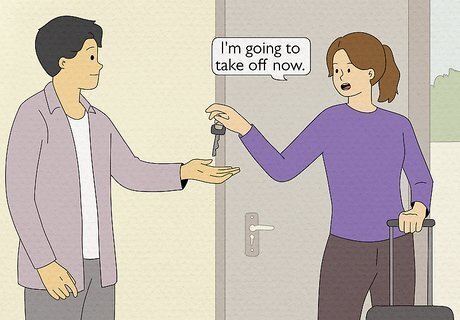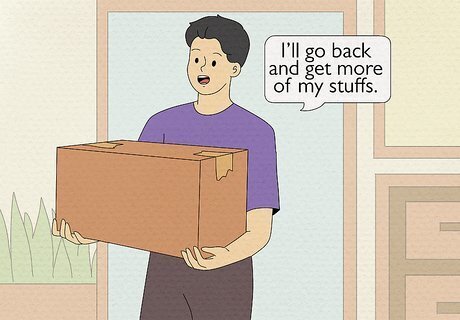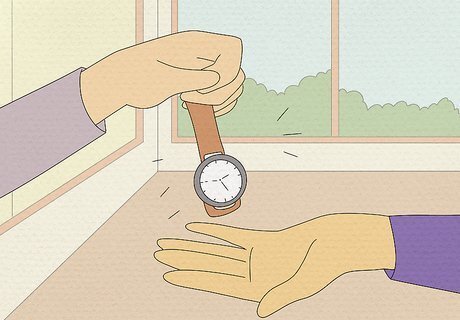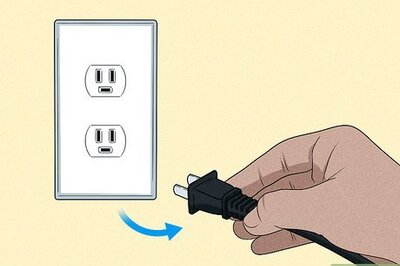
views
Scheduling a Time

Wait until you're calmer. It's best to wait at least a few days after the breakup to pick up your things so you'll have time to process and get your emotions under control. This way, you can go into the situation in a calmer, more collected fashion. Do things like get enough sleep, go out with friends, and spend a day pampering yourself to help yourself feel better. However, don't wait too long. It's best to retrieve your things within a couple of weeks of the breakup.

Send a text. A phone call can get messy and emotional, so send a text with a simple message to keep your composure. For example, text something like, "I still have some things at your place. Is there a good time to come over and pick them up?" Worst case scenario, you may have to call if your ex does not return your texts after a few days.

Schedule a time to pick up your things. Your ex may prefer not to be there when you pick up your stuff, so you may want to stop by while they're at work or out of the house. If your ex wants to be present, however, find a time that works for both of your schedules. Be as agreeable as possible, even if it's painful. Petty arguments often surface after breakups due to lingering emotions, so remind yourself to remain composed if you get angry. The sooner you get your things, the better. If you're having a hard time scheduling a pick-up time, see if at least some of the smaller items can be mailed to you.

Communicate only the essentials. When negotiating when to come over, stick to discussing the essentials. You don't want to trigger an argument about the breakup. Try to communicate in 5 minutes or less to prevent you or your ex from becoming emotional. Say something like, "Can you let me know a good time?" and ask any questions you have (i.e., "Can I let myself in or do you want to be there when I come over?").

Let your ex know how to interact with your stuff. If you're not comfortable with your ex touching your things, let them know you're happy to box everything up yourself. However, if you don't mind, you can have them box up your items to speed up the process for both of you. Make sure you're respectful when asking your ex to box up your items. Say something like, "Is there any way you could gather my things for me so we can get through this smoothly?"
Collecting Your Things

Enlist the help of a friend. If you don't want to go over alone, have a friend help you. This can also be useful if you left any big items, like electronics, at your ex's place. If you had an extremely messy breakup, a trusted friend can even agree to retrieve items for you. Make sure you pick the right friend to help. A friend who's prone to drama may be tempted to start a fight with your ex. Instead, opt for a friend who's generally cool and composed, even in stressful situations. If your ex is giving you a really hard time about retrieving your stuff, contact a friend or family member of your ex that you are on good terms with. They may be willing to help you.

Make small talk, if necessary. If your ex is present when you're over, it's best to minimize conversation. If you want to be pleasant, stick to small talk and simple questions rather than bringing up any major issues. For example, ask, "How's work?" or make a comment on the weather. Avoid open questions and topics that could yield negative answers. Asking "How have you been?", for example, may lead your ex to talk about their difficulty with the breakup. They also may pretend to be fine to hurt your feelings.

Try not to linger. It can be hard to let go, and you may be tempted to linger at your ex's place and make a lengthy goodbye. Focus on the fact you're there to get your stuff and not address any lingering issues with your ex. As soon as you get through the door, start gathering your things and leave as soon as you finish. If you want to say a goodbye before you go, keep it brief. Now is not the time to drag up lingering resentments or talk over the relationship. Say something like, "I'm going to take off now. I hope you're doing okay."

Make more trips, if necessary. If the two of you lived together, or if you simply left a lot at their place, you may have to make more trips. Grab the absolute essentials, like clothing, on the first trip. Then, before leaving, talk over when you can come back to get the rest of your stuff.

Keep physical contact to a minimum. You want to keep things as uncomplicated as possible, and physical contact after a breakup can get confusing. Avoid things like a prolonged hug hello or goodbye. If your ex offers a hug or another form of contact, keep it as brief as possible.
Dealing with Ownership Conflicts

Make lists prioritizing items. Agree that each of you will make a list of items you want that ranks the items in terms of priority. Place the items you want the most near the top. Keep the items you could live without toward the bottom.

Compare your list and find a compromise. Meet up in a neutral location, like a quiet coffee shop, to go over your lists. It's likely that there will be some disagreement, which should be addressed calmly. For example, maybe you both want the TV you bought together. See if your ex would offer a trade. Maybe you also both really like a particular coffee table, but your ex is a little more attached. Agree to let them have the coffee table if you can have the television set. For items you absolutely can't agree on, see if your ex is willing to sell the item and split the money.

Give pets to the primary caregiver. It's sad to let a pet go that you've come to care for, but remember to take the high road and do what's best for the pet. The pet should go to the primary caregiver. Whoever has the most time to care for the pet should take it in the breakup. For example, you have a dog with your ex. You have a demanding job and are away for long hours during the day, while your ex works from home. It makes sense to let your ex take the dog, as they'll be able to provide it with the most attention and care. It can be hard to let go of a pet. If you and your ex are still on good terms, you might be able to do something like have visiting hours with the pet or meet up at a local dog park on occasion.

Keep gifts, but return sentimental items. It's okay to keep gifts your ex bought for you over the years. If they gave you an item of clothing or household device, that's generally yours to keep. However, if they gave you a sentimental item, it's best to return it. For example, if your ex gave you their great-grandfather's watch, this should be returned.

Learn to take the high road. If your ex is being very difficult, try to be the bigger person. Remember, items can be replaced. It's worth splurging on, say, a new television set if it means ending a prolonged argument and making a clean break from your ex. If your ex won't let go of an item, and is unwilling to compromise, let them have their way. In some cases, however, you may need to bring in a friend or even a lawyer to mediate. If your ex is insisting on keeping high priced items, which you legally own, it may be worth your effort to try to get them back.




















Comments
0 comment